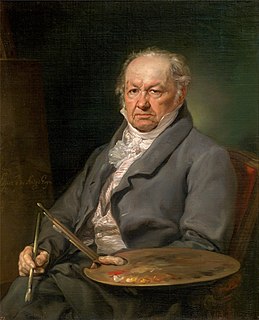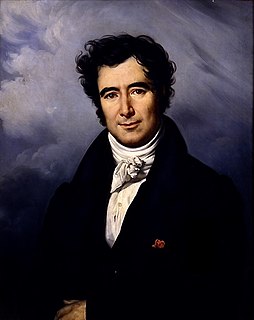A Quote by Francisco Goya
I have just returned from Arenas and feel very tired. His Excellency loaded me with a thousand honours; I have painted his portrait and that of his wife and boy and girl with unexpected success, for other artists had been there previously and not been successful.
Related Quotes
Vain men delight in telling what Honours have been done them, what great Company they have kept, and the like; by which they plainly confess, that these Honours were more than their Due, and such as their Friends would not believe if they had not been told: Whereas a Man truly proud, thinks the greatest Honours below his Merit, and consequently scorns to boast. I therefore deliver it as a Maxim that whoever desires the Character of a proud Man, ought to conceal his Vanity.
Every successful man must have behind him somewhere tremendous integrity, tremendous sincerity, and that is the cause of his signal success in life. He may not have been perfectly unselfish; yet he was tending towards it. If he had been perfectly unselfish, his would have been as great a success as that of the Buddha or of the Christ. The degree of unselfishness marks the degree of success everywhere.
A lot of artists still will not get that far. And get that far and be as successful. So, it's a great thing for me, and hopefully I can make it to number 10. And then I would want to start managing other artists, 'cause I think the best manager is an artist, his, or herself, that has been in the business and been successful and knows the ins and outs of the business.
Was his life nothing? Had he nothing to show, no work? He did not count his work, anyone could have done it. What had he known, but the long, marital embrace with his wife. Curious, that this was what his life amounted to! At any rate, it was something, it was eternal. He would say so to anybody, and be proud of it. He lay with his wife in his arms, and she was still his fulfillment, just the same as ever. And that was the be-all and the end-all. Yes, and he was proud of it.
They say that dogs may dream, and when Topsy was old, his feet would move in his sleep. With his eyes closed he would often make a noise that sounded quite human, as if greeting someone in his dreams. At first it seemed that he believed Sara would return, but as the years went by I understood that his loyalty asked for no reward, and that love comes in unexpected forms. His wish was small, as hers had been -- merely to be beside her. As for me, I already knew I would never get what I wanted.
I was often humiliated to see men disputing for a piece of bread, just as animals might have done. My feelings on this subject have very much altered since I have been personally exposed to the tortures of hunger. I have discovered, in fact, that a man, whatever may have been his origin, his education, and his habits, is governed, under certain circumstances, much more by his stomach than by his intelligence and his heart.
It would perhaps not be amiss to point out that he had always tried to be a good dog. He had tried to do all the things his MAN and his WOMAN, and most of all his BOY, had asked or expected of him. He would have died for them, if that had been required. He had never wanted to kill anybody. He had been struck by something, possibly destiny, or fate, or only a degenerative nerve disease called rabies. Free will was not a factor.
The weekend break had begun with the usual resentment and had continued with half-repressed ill humour. It was, of course, his fault. He had been more ready to hurt his wife's feelings and deprive his daughter than inconvenience a pub bar full of strangers. He wished there could be one memory of his dead child which wasn't tainted with guilt and regret.
The lights were off so that his heads could avoid looking at each other because neither of them was currently a particular engaging sight, nor had they been since he had made the error of looking into his soul. It had indeed been an error. It had been late one night-- of course. It had been a difficult day-- of course. There had been soulful music playing on the ship's sound system-- of course. And he had, of course, been slightly drunk. In other words, all the usual conditions that bring on a bout of soul searching had applied, but it had, nevertheless, clearly been an error.
There was a four year old child whose next door neighbor was an elderly gentleman who had recently lost his wife.
Upon seeing the man cry, the little boy went into the old gentleman's yard, climbed onto his lap, and just sat there.
When his Mother asked what he had said to the neighbor, the little boy said,
“Nothing, I just helped him cry.²”
“Even after all this time
the sun never says to the earth
“You owe me”
Look what happens with a love like that,
It lights the whole sky..”








































